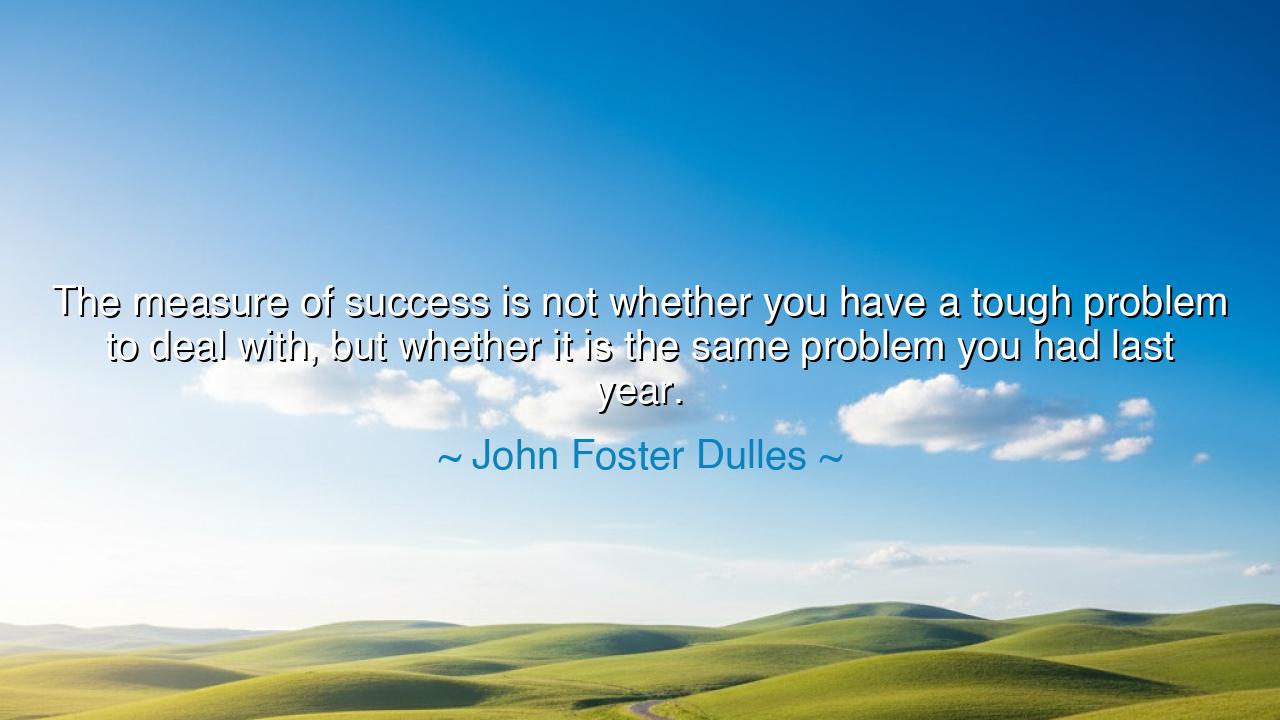
The measure of success is not whether you have a tough problem
The measure of success is not whether you have a tough problem to deal with, but whether it is the same problem you had last year.






John Foster Dulles, statesman and architect of American foreign policy, once said: “The measure of success is not whether you have a tough problem to deal with, but whether it is the same problem you had last year.” In these words lies a truth that rings as clearly today as it did in his time: success is not defined by the obstacles we face, but by how we overcome them. A problem that lingers year after year, unchanged and unresolved, is not just a challenge—it is a sign of stagnation, a failure to learn, grow, and move forward. Success, then, lies not in simply facing difficulties, but in confronting and overcoming them with wisdom, and ensuring that the same trials do not persist.
To speak of success as the overcoming of a repeated problem is to reveal the deeper meaning of progress. Each year brings new challenges, but to face the same one over and over is to mark time without growth. A warrior may encounter new battles, but if he is always fighting the same battle, he is trapped in a cycle. True success is found when the warrior no longer faces the same fight, when each year’s problems become new and different, signifying that the soul has moved, evolved, and learned.
This wisdom is not merely theoretical. In the life of Abraham Lincoln, we find a man who faced immense difficulties but never the same problem twice. He inherited a fractured nation, torn apart by slavery and civil war, and the weight of this conflict threatened to destroy him. Yet, Lincoln did not allow himself to be mired in the same struggle year after year. He found new ways to navigate the political and social storms of his time, always adapting and seeking resolutions to the ever-evolving challenges. The same problem—slavery—may have remained, but his methods, his approach, and his vision changed. Through this adaptability, Lincoln guided the nation through its darkest period and led it toward new birth.
History offers other examples of this truth. The legendary military strategist, Alexander the Great, was constantly confronted with new challenges as he expanded his empire. Yet his genius lay not only in his ability to confront these difficulties, but in his ability to adapt and innovate. Whether navigating the complex alliances in Persia or leading his army across the harshest terrains, Alexander’s success was measured by how he overcame the problems before him—not by how many times he fought the same battle. His legacy endures, not because he faced hardship, but because he found ways to rise above it and grow stronger with each new challenge.
The ancients, too, understood this principle. The Greek philosopher Heraclitus taught that change is the only constant. “You cannot step into the same river twice,” he said, for both the river and the man are in constant flux. This mirrors Dulles’s point—success lies in our ability to evolve and meet new challenges, rather than remain bogged down by the same trials. To remain in place, to face the same issues without change, is a sign of failure, not growth. The Greeks valued progress, the transformation of the individual and the state, over mere survival.
The meaning of Dulles’s words is both sobering and motivating. It compels us to take a hard look at our lives, to examine whether we are still confronting the same problems year after year. If we are, then we have not progressed as we should. Success is not simply about overcoming obstacles—it is about moving beyond them. It is about learning from the past and ensuring that we do not repeat the same mistakes. Success is the art of finding new problems to solve, new horizons to reach, and new challenges to conquer.
For those who hear this wisdom today, the lesson is clear: do not let the same problems persist. When faced with difficulty, do not simply struggle through it and move on—learn from it, adapt, and find new ways to solve it. Practical steps follow: when a problem arises, ask yourself: “What can I learn from this that will change my approach next time?” Cultivate the habit of change, innovation, and growth, so that each year’s challenges are not a repetition of the old, but a step toward something new and better. Only then will you know the true meaning of success.
Thus, Dulles’s words echo through the ages: “The measure of success is not whether you have a tough problem to deal with, but whether it is the same problem you had last year.” Let them serve as a reminder that success is not about enduring hardship, but about transforming it. Every challenge is an opportunity to evolve, to adapt, and to ensure that when the year turns, you are not facing the same fight, but a new one—one that reflects your growth, your learning, and your forward movement toward your highest self.






AAdministratorAdministrator
Welcome, honored guests. Please leave a comment, we will respond soon